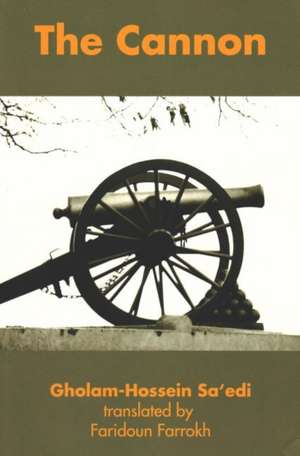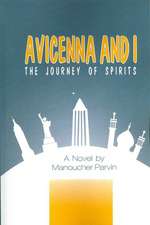The Cannon
Autor Gholam-Hossein Sa'edi Traducere de Faridoun Farrokhen Limba Engleză Paperback – 3 ian 2010
Preț: 164.31 lei
Preț vechi: 191.48 lei
-14% Nou
Puncte Express: 246
Preț estimativ în valută:
31.44€ • 32.71$ • 25.96£
31.44€ • 32.71$ • 25.96£
Carte disponibilă
Livrare economică 25 martie-08 aprilie
Livrare express 08-14 martie pentru 48.53 lei
Preluare comenzi: 021 569.72.76
Specificații
ISBN-13: 9781588140685
ISBN-10: 1588140687
Pagini: 184
Ilustrații: black & white illustrations
Dimensiuni: 154 x 229 x 12 mm
Greutate: 0.26 kg
Ediția:New.
Editura: IBEX Publishers,U.S.
ISBN-10: 1588140687
Pagini: 184
Ilustrații: black & white illustrations
Dimensiuni: 154 x 229 x 12 mm
Greutate: 0.26 kg
Ediția:New.
Editura: IBEX Publishers,U.S.
Cuprins
Sacred Proposals & the Spiritual Sublime; "Loke in: How weet a wounde is here!": The Wounds of Christ as a Sacred Space in English Devotional Literature; Suffering in the Service of Venus: The Sacred, the Sublime, & Chaucerian Joy in the Middle Part of the Parliament of Fowls; Listening to Lavinia: Emmanuel Levinas's Saying & Said in Titus Andronicus; Precious Stories: The Discursive Economy in Shakespeare's Rape of Lucrece; The Sacred Pain of Penitence: The Theology of John Donne's Holy Sonnets; Bearing the Cross: The Christian's Response to Suffering in Herbert's The Temple; Horrific Suffering, Sacred Terror, & Sublime Freedom in Helen Maria Williams's Peru; Joanna Baillie & the Christian Gothic: Reforming Society Through the Sublime; Sacramental Suffering & the Waters of Redemption & Transformation in George Eliot's Fiction; Christina Rossetti & the Poetics of Tractarian Suffering; Suffering in Word & in Truth: Seventeenth & Nineteenth Century Quaker Women's Autobiography; Sacramental Imagination: Eucharists of the Ordinary Universe in the Works of Joyce, Proust, & Woolf; The Via Negativa in E M Forster's A Passage to India; Consolation in Un/certainty: The Sacred Spaces of Suffering in the Children's Fantasy Literature of George MacDonald, C S Lewis, & Madeleine L'Engle; The Messiah of History: The Search for Synchronicity in Miller's A Canticle for Leibowitz; Suffering & the Sacred: Hugh Hood's The New Age / Le nouveau siecle; Fictional Violations in Alice Munro's Narratives; Thomas Merton & the Aesthetics of the Sublime: A Beautiful Terror; Belated Beloved: Time, Trauma, & the Sublime in Toni Morrison's Beloved; Annie Dillard on Holy Ground: The Artist as Nun in the Postmodern Sublime; Passion Plays by Proxy: The Paschal Face as Interculturality in Endo Shusaku & Mishima Yukio; Testifying to the Infinity of the Other: The Sacred & Ethical Dimensions of Secondary Witnessing in Anne Karpf's The War After; Sacred Space & the Fellowship of Suffering in the Postmodern Sublime; Suffering Divine Things: Cruciform Reasoning or Incarnational Hermeneutics; Index.
Descriere
"The Cannon" is the first and considered the best of Saedi's three novels. Based on historical events, the novel is set in northwestern Iran in the early 20th century and features tribal supporters of the Constitutional Revolution; Russian Cossacks who are backing the status quo; and the itinerant Mullah Mir Hashem.







